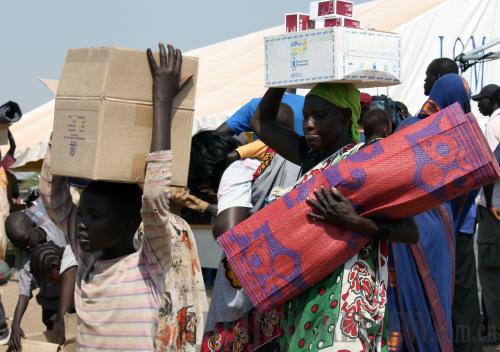|
 |
|
ASSISTANCE TO VICTIMS: South Sudanese refugees receive emergency supplies at a UN peacekeeping camp in Juba on December 29, 2013 (XINHUA) |

South Sudan, which was full of hope for better days when it gained independence two and a half years ago, has undergone a great humanitarian crisis. Thousands have died and large numbers of refugees continue to swarm into UN peacekeeping camps in the country. The conflict originated from the power struggle between its President Salva Kiir Mayardit and former Vice President Riek Machar. In early 2013, reports detailing the differences between the two senior politicians emerged when they began preparing for the presidential election in 2015. In April 2013, President Kiir began to scale back Machar's power. Three months later, he dismissed the vice president and reshuffled his cabinet.
The increasingly sharp confrontation eventually led to military conflict at the end of 2013. Disturbingly, the divergences and power struggles between the two major factions of the ruling Sudan People's Liberation Movement soon escalated into tribal massacres, as their tribal roots superseded national identity. The slaughter between the country's largest tribe, the Dinka, to which Kiir belongs, and Machar's Nuer tribe, the country's second largest, worsened the country's situation, pushing it to the edge of nationwide civil war.
Conflict impact
The South Sudanese people and the country's development process have been impacted by the conflict. The country's reconstruction has come to an abrupt halt. Fighting between the tribes has destroyed the country' sense of national identity and the country is on the brink of becoming a "failed state."
In addition, the conflict threatens the security and stability of the Horn of Africa and Central and East Africa, which have long been torn apart by extremist and terrorist organizations and various anti-government forces. In recent years, Al Shabaab's terrorist activities have spread beyond the territory of Somalia to Uganda and Kenya. To make matters worse, Uganda and the Democratic Republic of the Congo also frequently suffer from attacks launched by anti-government forces such as the Lord's Resistance Army and the March 23 Movement. The Central African Republic has been in the grip of civil war since mid-2013.
In this context, the conflict in South Sudan could have spillover effects on neighboring countries such as Ethiopia, Kenya, Uganda, the Democratic Republic of the Congo, the Central African Republic and Sudan.
The United States and other Western countries that supported South Sudan's independence must now face the troubling reality of the situation. Previously, the U.S. Government proudly interpreted the scheduled referendum for South Sudan's independence in February 2011 and the improvement of U.S.-Sudan relations as evidence of successful implementation of its new Sudan strategy. While announcing the new strategy in September 2010, the Obama administration made clear that the strategy includes "implementation of the north-south CPA (Comprehensive Peace Agreement) that results in a peaceful post-2011 Sudan, or an orderly path toward two separate and viable states at peace with each other" and ensures that "Sudan does not provide a safe haven for international terrorists."
Supporting South Sudan's independence is the goal of the new strategy. More importantly, the U.S. strategic goal implies its dual long-term considerations of coveting the abundant oil resource in Sudan and preventing a Sudanese Islamic regime from spreading its influence and further destabilizing the region.
China's role
China, the largest oil investor in Sudan and South Sudan, is also a victim of the conflict. After the fighting broke out, China National Petroleum Corp. had to recall more than 400 workers to Khartoum, Sudan's capital, and closed some oil fields in remote areas of South Sudan. There were 2,300 Chinese in South Sudan before the conflict, and more than half of them had left the country as of mid-January. Undoubtedly, the expansion of the conflict could severely threaten China's investment in South Sudan.
In order to help South Sudan resume peace and stability, China has not rigidly followed its traditional policy of "noninterference in other countries' internal affairs," or taken a "laissez-faire" policy so as to avoid its responsibilities. In this event, the Chinese Government actively promotes reconciliation through constructive intervention.
China has called on the warring parties to keep calm and exercise restraint to solve their divergences through negotiations. While supporting the mediation work of the African Union and the Intergovernmental Authority on Development in Eastern Africa, the Chinese Government sent a special envoy to South Sudan and surrounding countries. Also, Wang Yi, Minister of Foreign Affairs, met representatives of the warring parties, listened to their respective cases and encouraged reconciliation during his recent visit to Ethiopia.
China and other members of the UN Security Council pushed the council to adopt a resolution of increasing UN peacekeeping forces in South Sudan. The number of UN peacekeepers increased from 7,000 to 12,500, and peacekeeping police from 900 to 1,323. In addition, in order to ease the severe humanitarian crisis in South Sudan, the Red Cross Society of China offered emergency cash assistance of $100,000 to the fledgling nation.
Mediation essential
After the conflict in South Sudan broke out, the international community launched mediation for reconciliation. Thanks to these efforts, representatives from the warring parties started negotiations in Addis Ababa, capital of Ethiopia, on January 5, working to peacefully resolve the conflict. After weeks of slow-moving negotiations, the South Sudanese Government and rebels signed a ceasefire agreement on January 24. This showed South Sudanese people and leaders do not want to embark down the bitter road of civil war and national split. Further consultations are planned to take place before the beginning of the next round of peace talks.
Against this backdrop, the warring parties should abandon their struggles for power and old historical grudges and reach consensus through full negotiations on the basis of the four principles of ceasing hostilities, releasing political detainees, launching political dialogue and facilitating humanitarian assistance. No other external military force is allowed to interfere except for the UN peacekeeping forces that provide humanitarian assistance and engage in protection work.
Though the path to resolution will be a complicated one, South Sudan, a country that achieved independence after 22 years of civil conflict, can no longer withstand another full-on war. Only peace can bring the country hope for the future.
The author is a senior research fellow with the Charhar Institute and a researcher with the Institute of West Asian and African Studies at the Chinese Academy of Social Sciences
Email us at: yanwei@bjreview.com | 